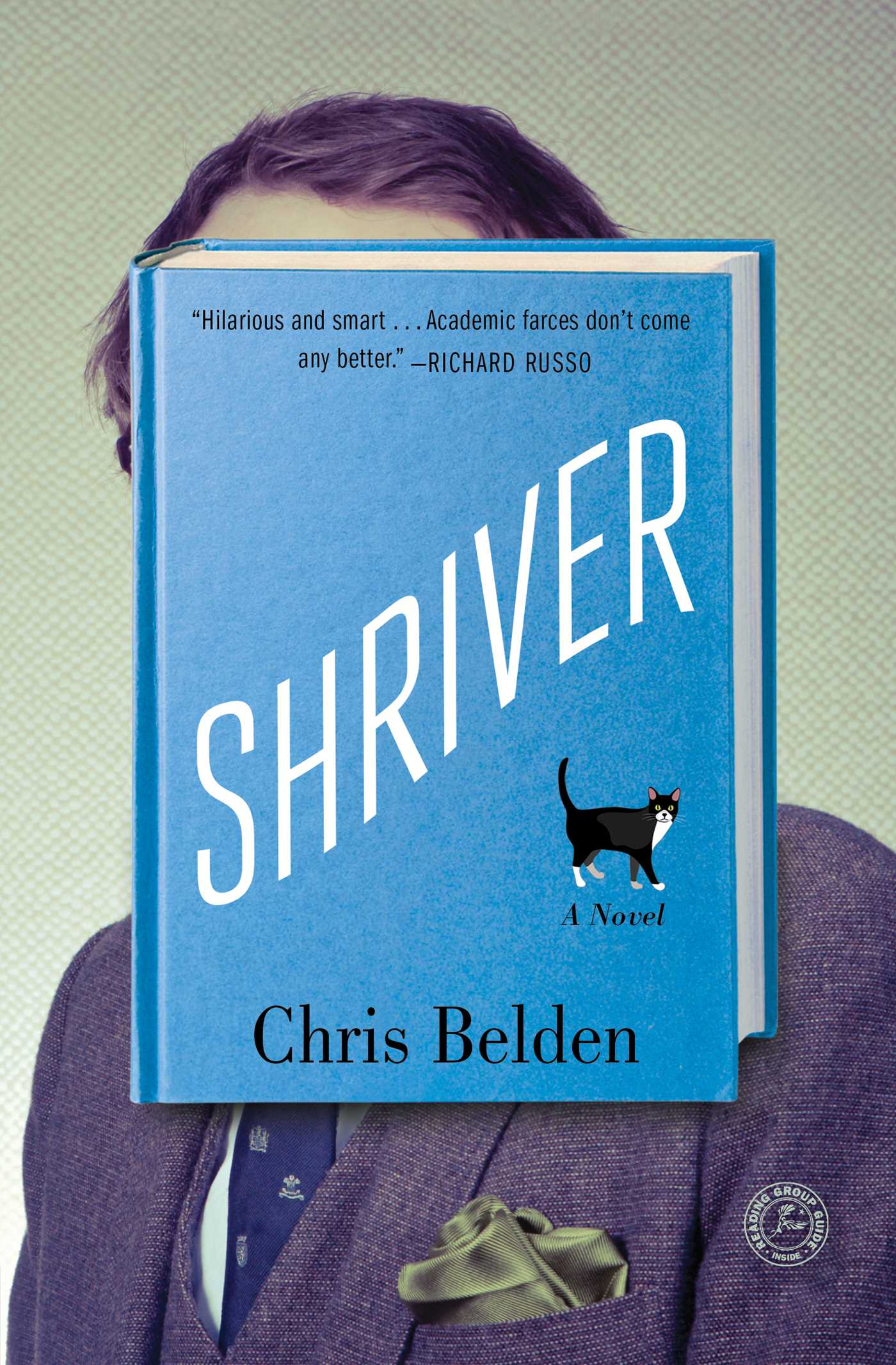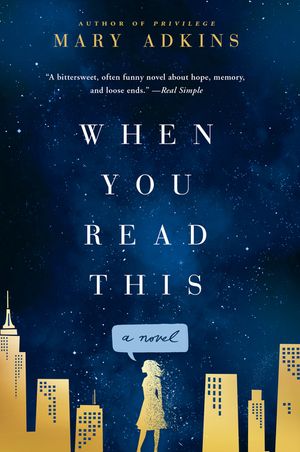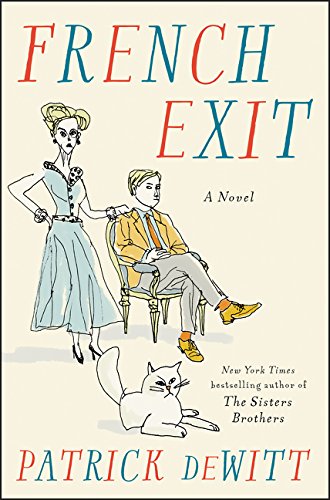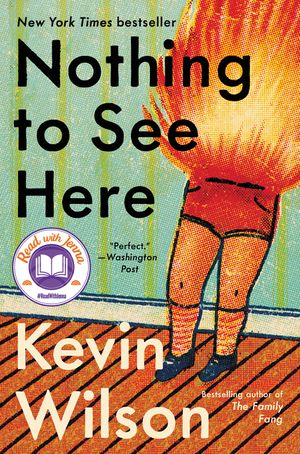I find dark humor the perfect category for when I’m feeling indecisive or having trouble focusing. Reading about self-aware characters in unfortunate circumstances reminds me not to take myself too seriously and helps me feel less overwhelmed in tough situations. The ability to shift perspectives and laugh at the unexpected is always important, especially now. Dig into these nine novels for some memorable scenarios with entertainingly vulnerable characters.

9 Darkly Funny Reads for When Life Feels Overwhelming
The opening pages had me both laughing and grimacing at the protagonist’s confusion. An older man who appears not to have left his home for a significant period of time, he accepts an invitation to a writers’ conference to give a reading of a popular novel he never wrote. He expects the letter to be revealed as a practical joke, but when a driver arrives to take him to the airport and he meets a fan on the plane, he soon realizes the predicament he’s in: There is a Shriver who’s penned a novel, but it’s not him. The ridiculous situations that pile up make this lonely, befuddled man all the more endearing, and his ill-advised actions make it impossible to look away.
An academic farce and literary puzzle set at a writer’s conference at a small liberal arts college, SHRIVER is the story of a solitary divorcé who is mistaken for a famous but reclusive author of the same name. Unable to admit that he isn’t an author, Shriver participates in the conference under false pretenses. But it soon becomes clear that nothing is quite as it seems.
Read the full review of SHRIVER here.
Prepare yourself for this unconventional opening: Thirty-three-year-old Iris Massey learns she’s dying of lung cancer. Shortly after opening a window into her life and mindset, the novel skips forward a few months and we find that Iris has passed away. In her place are her sister, Jade, and old boss, Smith, who begin an argumentative email relationship over whether to publish a blog Iris kept from her diagnosis until her death. As they continue to banter, surprising conversations unfold. The book’s unique format—the story is told through online correspondence including blog posts, advertisements, and emails—reveals interesting perspectives on the ways we communicate and prioritize events.
For me, this book was Schitt’s Creek meets Arrested Development. If you’ve watched either, you know how hard it can be to love the characters, yet you begin to tolerate them and their eccentricities, their interpretations of the world. Suddenly you find yourself rooting for them through their mishaps, their unattainable expectations, and their unconventional ways of reaching out to others. The cast of FRENCH EXIT weaseled their way into my mind in a similar fashion. Frances, a conflicted and privileged widow fleeing to Paris with her son to try to carve out a life with the remaining funds from her late husband’s depleting estate, meets a wild ensemble with very different needs and motivations. The humorous mesh of personalities captures the complexities of a society laced with hypocrisy and emptiness, aided by a cat who may or may not contain the spirit of Frances’s dead husband.
There are children who catch on fire in this novel. The heat doesn’t hurt them, however; it only hurts the flammable objects that happen to be in their way. I say this not to shock but to capture the matter-of-fact tone with which the protagonist, Lillian, describes their affliction. After the children’s mother dies, they’re expected to live with their wealthy father, a politician mainly concerned with his image, and their stepmother, Madison, who was briefly Lillian’s roommate at boarding school. Instead, Lillian, whose future Madison ruined once before, is called to stay in the guest house with the children. Her orders are to keep them hidden away until a larger plan can be concocted. Until then, Lillian tries to devise creative ways of dealing with the children’s flames—which tend to appear when they’re upset or uncomfortable—earning herself a makeshift family and a new purpose along the way.
Kit lives in Bay Ridge, Brooklyn, with her husband and works at her sister’s bakery, so this book’s title referring to a craving for sweets disrupting Kit’s latest diet or wellness fad isn’t so hard to imagine. Instead, the double entendre comes in the form of contractor Matt, whom Kit must supervise on the evenings he comes to install shelving in the bakery’s kitchen. Their entertaining dialogue and clear attraction quickly blossom into an affair that leaves Kit questioning the devices she thought she was using to stabilize her life and her expectations for her future. As she puts it, “I’d always thought . . . cheating was a symptom of some deeper decay. But that was before I had a contradictory experience of my own.”
A smart and funny debut novel about the unexpected consequences of one woman’s attempt to exert control over her entire life by adhering to a strict wellness regimen.
“Liv Stratman writes with such clarity, intelligence, and zip the Brooklyn debut novel is reborn in Cheat Day.” —Lorrie Moore
Kit and David were college sweethearts. Now married and twelve years older, they live in Kit’s childhood home in Bay Ridge, Brooklyn. While David has a successful career, jetting off on work trips to exotic destinations, Kit is stuck in a loop. She keeps quitting her job managing her sister’s bakery to seek a more ambitious profession, but fear of failure always brings her right back to Sweet Cheeks. Kit finds a fraught solace in cycling through fad diets, which David, in his efforts to be supportive, follows along with her. Their latest program is the Radiant Regimen, an intense seventy-five-day cleanse, and Kit is optimistic about embarking on a new chapter of clean eating and self-control.
But hungry in more ways than one, she soon falls into a flirtation with a carpenter named Matt who is building new shelves for the bakery kitchen. Unable to resist their mutual attraction, Kit and Matt fall into a passionate affair. Kit suppresses the guilt of her betrayal by adhering more and more strictly to the Radiant Regimen, pushing the diet, and her infidelity, to greater extremes.
Told in precise, intimate detail, Cheat Day is a sharply comic novel that explores family, loyalty, monogamy versus monotony, deprivation versus indulgence, and the limitations of modern wellness.
What begins with strangers beating on Sasha’s door and calling for her death quickly veers in a new direction as she connects with her friend Dyson and embarks on a mission that he frames as a way to rehabilitate men. Sasha was an Internet sensation, encouraging followers to disregard expensive and intensive skin-care products in favor of “refusal, relaxation, and patience.” But when a man comments on her post and then dies by suicide, she’s demonized by the public and her loved ones—that is, until Dyson approaches her with his theories about the kind of men who’ve been “hording together unprompted to perform mundane social activities” and how to help them. Dyson’s idea is to create the Atmosphere, a community whose goals are to help men battle their rage and to show them how to let others step forward and speak.
A “dazzling” (Bryan Washington, author of Lot) and brilliantly satirical debut novel for fans of Women Talking and Red Clocks about two best friends—a disgraced influencer and a struggling actor—who form The Atmosphere, a cult designed to reform problematic men.
Sasha Marcus was once the epitome of contemporary success: an internet sensation, social media darling, and a creator of a high profile wellness brand for women. But a confrontation with an abusive troll has taken a horrifying turn, and now she’s at rock bottom: canceled and doxxed online, fired from her waitress job and fortressed in her apartment while men’s rights protestors rage outside. All that once glittered now condemns.
Sasha confides in her oldest childhood friend, Dyson—a failed actor with a history of body issues—who hatches a plan for Sasha to restore her reputation by becoming the face of his new business venture, The Atmosphere: a rehabilitation community for men. Based in an abandoned summer camp and billed as a workshop for job training, it is actually a rigorous program designed to rid men of their toxic masculinity and heal them physically, emotionally, and socially. Sasha has little choice but to accept. But what horrors await her as the resident female leader of a crew of washed up, desperate men? And what exactly does Dyson want?
Explosive and wickedly funny, this “Fight Club for the millennial generation” (Mat Johnson, author of Pym) peers straight into the dark heart of wellness and woke-ness, self-mythology and self-awareness, by asking what happens when we become addicted to the performance of ourselves.
A daunting task awaits Harry in THE LAST WORD, a biographical-fiction book about the great writer Mamoon Azam. In his heyday, Mamoon was always the focus of attention, selling book after book, but his stock has since fallen. To boost Mamoon’s profile, his publisher crafts one last pitch: a young writer will spend time with Mamoon and write his story. Harry is intimidated by the idea of approaching such a man, but fears being forced to teach creative writing should this endeavor fail. In the publisher’s words, “Harry should write as ‘mad and wild’ a book as he could,” with the idea that it will sell even more once Mamoon dies. The cover alone sparks interest, its vagueness matching the unsettling layers of Mamoon’s true personality that Harry reveals as he attempts to finish this career-changing project.
“Hanif Kureishi’s best novel since The Buddha of Suburbia” (The Independent, UK): a mischievous, wickedly funny, and intellectually deft story about a young biographer and the famous and reclusive novelist who is his subject.
Mamoon Azam is an eminent Indian-born writer who has made a career in England—but now, in his early seventies, his reputation is fading, his book sales are nonexistent, and the expensive habits of his flamboyant second wife are bleeding him dry. In a final attempt to revitalize his career, Mamoon’s publisher commissions Harry, an ambitious young writer, to produce a provocative biography to bring Mamoon back into the public eye.
Harry sets off for Mamoon’s estate, where he finds not the literary hero he had imagined, but a vain, bigoted, cynical, and cruelly manipulative genius, who quickly turns the tables on his ambitious young biographer. Harry must insinuate, seduce, and finesse the truth out of the extravagant and damaged characters in Mamoon’s surreal sphere as the young writer and the old master battle for the last word in the story of Mamoon’s life. Acute and brilliantly entertaining, The Last Word is a tale of youthful exuberance and the misery of outgrowing it, as hilarious as it is moving. It is Kureishi’s wisest work to date.
We meet Miranda as she lies on the floor in a position that’s supposed to help decompress her spine and watches a targeted ad about pain. She works in a college theatre department after an accident ruined many of her dreams and consigned her to a life of chronic pain that leaves her isolated and often disbelieved. Against the wishes of her acting students, she feels compelled to put on Shakespeare’s All’s Well That Ends Well, a play that holds much significance for her. Soon she encounters three strangers who seem to know more about her than possible, and who offer up a tempting image of her future. Miranda’s voice grabbed me immediately, along with the novel’s examination of the often-temperamental world of theatre and the complex topic of pain.
From the author of Bunny, which Margaret Atwood hails as “genius,” comes a dazzling and darkly funny novel about a theater professor who is convinced staging Shakespeare’s most maligned play will remedy all that ails her—but at what cost?
A MOST ANTICIPATED BOOK OF SUMMER 2021 SELECTED BY * ENTERTAINMENT WEEKLY * VULTURE * LITHUB * REFINERY29 * GOODREADS * POPSUGAR * NOW MAGAZINE * BOSTON * AND MORE
“[A] sparkling valentine to the Bard. A dream of a novel, perfect for a midsummer night’s read.”—OPRAH DAILY
“A dazzling wild ride of a novel—daring, fresh, entertaining, and magical.” —GEORGE SAUNDERS
“Wild and exhilarating and so fresh it takes your breath away.” —LAUREN GROFF
“Oh my lord what a fabulous novel—knocked me out!”—MARY KARR
Miranda Fitch’s life is a waking nightmare. The accident that ended her burgeoning acting career left her with excruciating, chronic back pain, a failed marriage, and a deepening dependence on painkillers. And now she’s on the verge of losing her job as a college theater director. Determined to put on Shakespeare’s All’s Well That Ends Well, the play that promised, and cost, her everything, she faces a mutinous cast hellbent on staging Macbeth instead. Miranda sees her chance at redemption slip through her fingers.
That’s when she meets three strange benefactors who have an eerie knowledge of Miranda’s past and a tantalizing promise for her future: one where the show goes on, her rebellious students get what’s coming to them, and the invisible, doubted pain that’s kept her from the spotlight is made known.
With prose Margaret Atwood has described as “no punches pulled, no hilarities dodged...genius,” Mona Awad has concocted her most potent, subversive novel yet. All’s Well is the story of a woman at her breaking point and a formidable, piercingly funny indictment of our collective refusal to witness and believe female pain.
The narrator’s opening confession about a string of unfortunate events that led to a wrongly perceived dognapping is one of the funniest I’ve read in a while. Ray is also a fan of the walkie-talkie, which I’ve always thought to be a great, efficient way to communicate. When his wife asked for a divorce, Ray moved to a nearby motel—but not before leaving one walkie-talkie with her for when she was ready to get back together. And sometimes, that means going back to his old house to make sure the walkie-talkie’s batteries still work, even if he’s forbidden from entering the property. Sure, he has gambling debts. Sure, he was fired from his job at ESPN. But Ray is one of those characters who makes you root for him anyway, as you laugh at topics you might not have expected to laugh at and recognize emotions that have long lain buried.
Swimming with Bridgeport Girls is an “outstanding debut…entertaining and sometimes sad, a superb portrait of a troubled but wisecracking gambler. Think Carl Hiaasen meets Fyodor Dostoevsky’s The Gambler” (Library Journal, starred review).
Ray Parisi is in trouble. Fired from his anchor job at ESPN after one-too-many public humiliations, he is holed up in a motel and in desperate need of a break. His ex-wife is shacking up with another guy in his old house, a bookie wants to kill him, and he’s wanted by the New York State Police. A few days before the Fourth of July, he unexpectedly receives an inheritance from his long-lost father, and it seems like all of his problems might be solved. Determined to get his life back together, Ray hatches an imaginative but highly suspect plan to win back his wife, dashing from Connecticut to Las Vegas to Memphis in an attempt to secure his future before the past runs him down. The cast of characters he meets along the way is as loveable as it is absolutely insane.
If Swimming with Bridgeport Girls “were a Springsteen album, it would be Devils & Dust: partly set in Las Vegas, it evinces hope and humor but is dark and gritty at its core” (Kirkus Reviews). Anthony Tambakis’s first novel is an uproarious romantic comedy about a charismatic gambler who loses everything and sets off on a mission to—against all odds—finally get it right.
MENTIONED IN:




















